Seeking refuge in Kakuma camp, Kenya
Emergency
Kenya
Somaliland
South Sudan
A new photo report telling the stories of South Sudanese and Somalian refugees in Kakuma, Kenya.

© P. Meinhardt/Handicap International
A new photo report telling the stories of South Sudanese and Somalian refugees in Kakuma, Kenya.

© P. Meinhardt/Handicap International
Record numbers of people are fleeing war, drought, and famine in South Sudan and Somalia. People with disabilities or injuries are forced to take enormous risks to reach a place of safety. Handicap International is working hard to make sure that thousands of people in similar situations across East Africa receive immediate card and long-term support.
Handicap International works in refugee and internally displaced persons camps in South Sudan, Kenya, Ethiopia, and Somaliland. We will be launching activities in Uganda in the coming months.
There are currently 1.8 million South Sudanese and nearly 1 million Somalian refugees in the region in addition to millions more internally displaced people. These numbers are only expected to rise as the food crisis worsens. It is vital that all governments and aid agencies take into account the needs of people with disabilities.
Stand with and vulnerable people facing imminent famine. Please donate today
Refugee camps like Kakuma in Kenya are large, complex structures with many people arriving and leaving every day. Due to the violence and lack of health care in the countries people are fleeing from, a high proportion of people need urgent assistance. Here are just a few stories of South Sudanese and Somalian refugees who are seeking refuge in Kakuma.
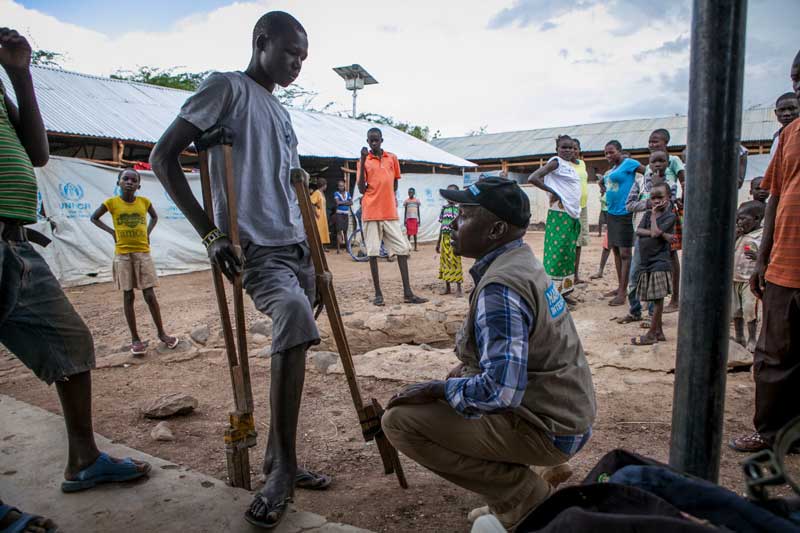
© P. Meinhardt/Handicap International
In December 2016, Simon’s family ran out of food. He was searching for honey and wild fruits when he was shot in the leg. The health center near his village had been abandoned so his injury was left untreated.
Handicap International met Simon the day after he and his four young sisters arrived at Kakuma refugee camp in Kenya. His parents, after months of not being able to find enough food and water, made the difficult decision to send their children to safety alone. Handicap International has provided Simon with new, more comfortable crutches and will provide support in continuing his education.
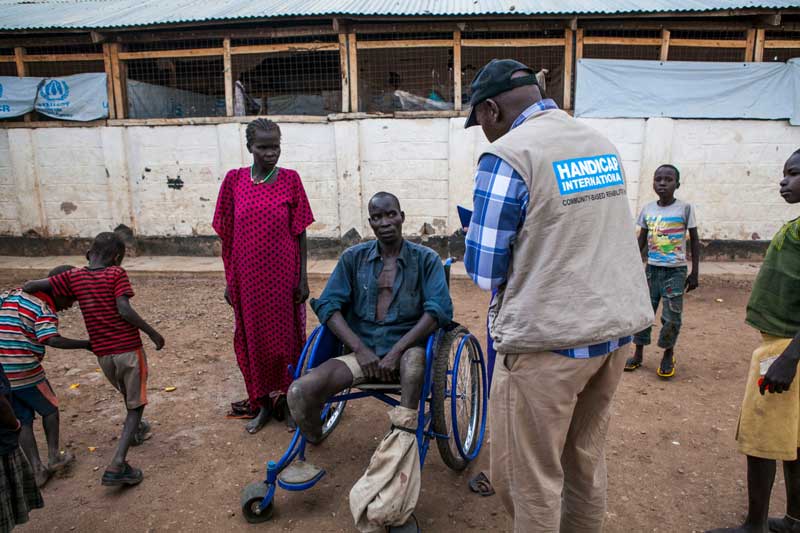
© P. Meinhardt/Handicap International
Ajeu arrived on 27th May 2017, after hitching lifts on the back of motorbikes. He lost his right lower leg in 2005 after a gunshot injury but was still able to grow crops on his land and support his family. In 2015, an infected wound led to the amputation of his left foot and the family began to run out of money and food. Due to the lack of healthcare professionals and medication, Ajeu’s leg became infected again.
When Ajeu was first identified at the reception center, his leg was wrapped in dirty sacks. He is now being treated at the hospital and will receive mobility aids from Handicap International that will improve his quality of life.
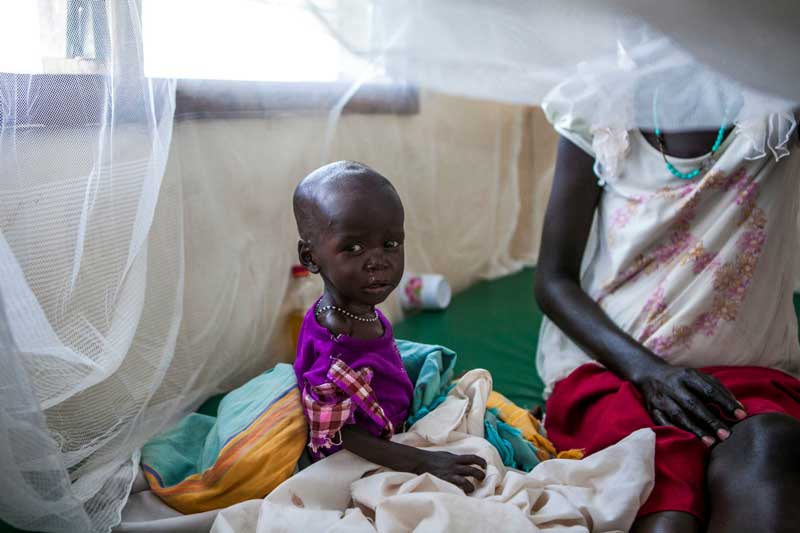
© P. Meinhardt/Handicap International
Agnes arrived at Kakuma in May and was quickly diagnosed with severe malnutrition. Rates of malnutrition are now at alarming levels among refugee populations. Children under five become extremely vulnerable to infection, delayed development, and permanent disability.
In response to the alarming increase in these cases, Handicap International has launched physical and cognitive stimulation projects for malnourished children like Agnes in Kenya, Ethiopia, Somalia, and Uganda.
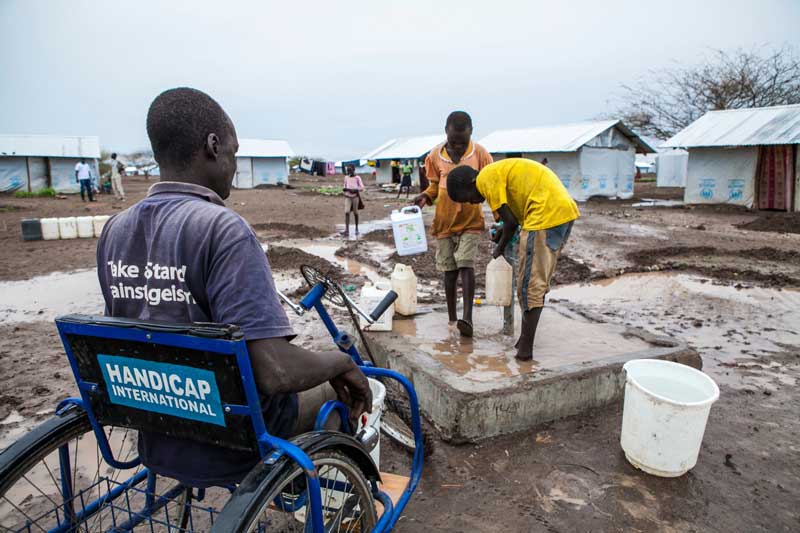 © P. Meinhardt/Handicap International
© P. Meinhardt/Handicap International
Once people have received urgent healthcare, it is important to make sure that they are able to meet their daily needs in the camp. This means fair and easy access to food, water, and sanitation.
Abdullah, a widower, has been in Kakuma camp with his four children since the end of 2016. Handicap International provided him with a tricycle that helps him move around the camp. Abdullah still needs support from his eldest son with many tasks, which means his son sometimes misses school. Our teams referred Abdullah for surgery and hopes to fit him with a artificial limb limb to give him more independence.
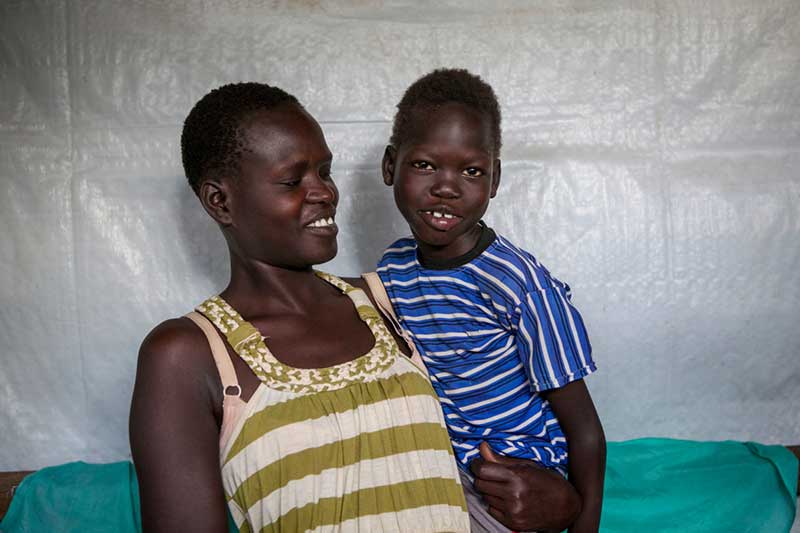
© P. Meinhardt/Handicap International
For financial reasons, many women arrive at Kakuma with their children but without their husbands, leaving them as the sole provider.
Ariet arrived in Kakuma with her three children at the end of April 2017. She felt she had no other option but to leave Juba as food had become too expensive and the family were only eating one meal a day. She was particularly worried about Omat, who has severe cerebral palsy and requires 24-hour care.
Handicap International has provided Omat with an adapted wheelchair, which will enable Ariet and Omat to move around the camp and access services more easily. Our physical therapists are teaching Ariet some simple exercises that she can carry out herself. Over time, these exercises will improve Omat’s mobility and reduce pain.
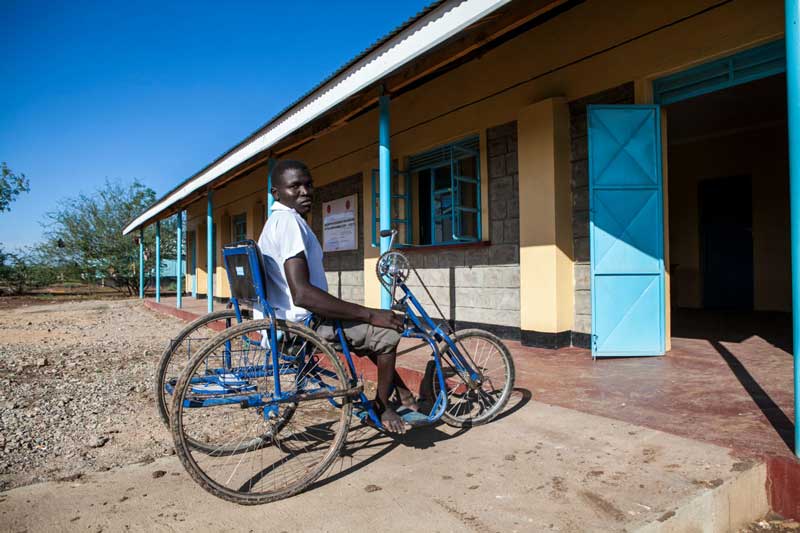
© P. Meinhardt/Handicap International
Although refugees find themselves in an uncertain and challenging environment, aspirations are high and education is considered a priority. After years of violence and displacement, many young people have spent very little time at school.
Children and young people with disabilities, like Yusef, are often underestimated by their families and peers. Handicap International makes sure that schools and community spaces are accessible and adapted that everyone has an opportunity to achieve their goals. Yusuf is determined to get his school diploma.
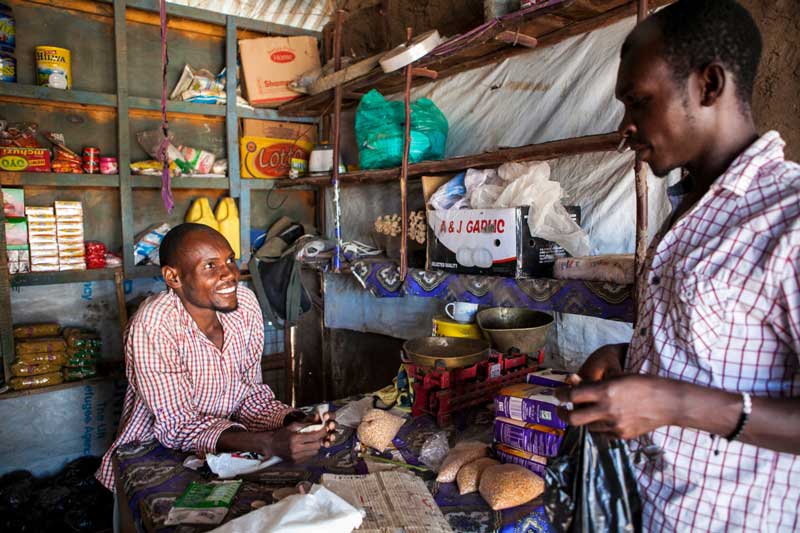 © P. Meinhardt/Handicap International
© P. Meinhardt/Handicap International
Life in a refugee camp does not mean “life on hold.” Shops, schools, markets, and meetings create a lively community and economy. Handicap International helps people with disabilities to take on active roles and to establish their place in society.
Noor has difficulty walking and has lived in Kakuma camp for several years. Handicap International has provided him with mobility aids which have helped him to set-up a small grocery shop. This additional income supplements his family’s food ration.
Recently, Noor has become involved in HI’s disability rights groups where he is learning how to advocate for the needs of people with disabilities. The groups aim to combat discrimination and to have fair access to all services.
Handicap International teams are working to ensure that no one is left behind. Can we count on you to help us provide aid to the most vulnerable people? Please donate today to support our work
COUNTRIES
Get the latest news about Humanity & Inclusion's work delivered straight to your inbox.
ABOUT US
Humanity & Inclusion U.S.
8757 Georgia Avenue
Suite 420
Silver Spring, MD 20910
MORE INFORMATION
Humanity & Inclusion is a nonprofit 501(c)(3) organization (EIN/tax ID number: 55-0914744). Contributions are fully tax-deductible to the extent allowable by law. CFC #51472
None of the funds donated through this website will benefit activities in the following countries: Cuba, Iran, North Korea, the Crimea Region, or Syria. Humanity & Inclusion does not have programs in all of these countries.